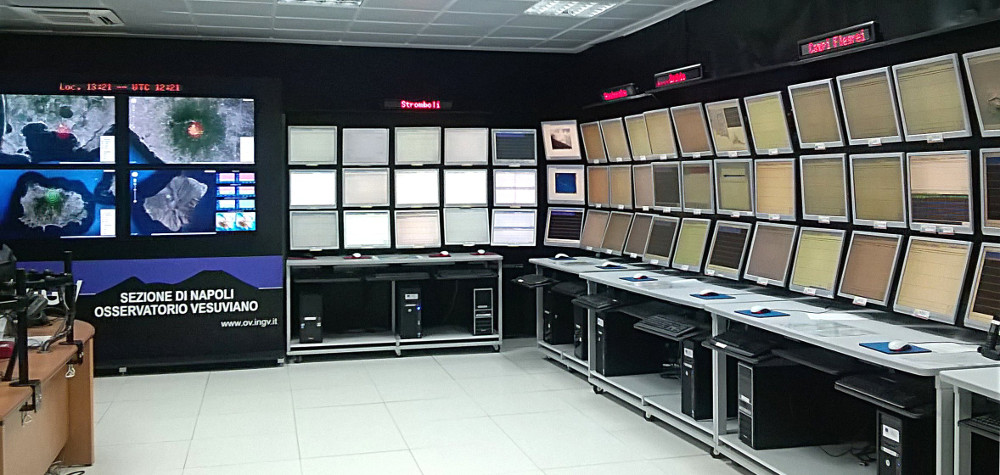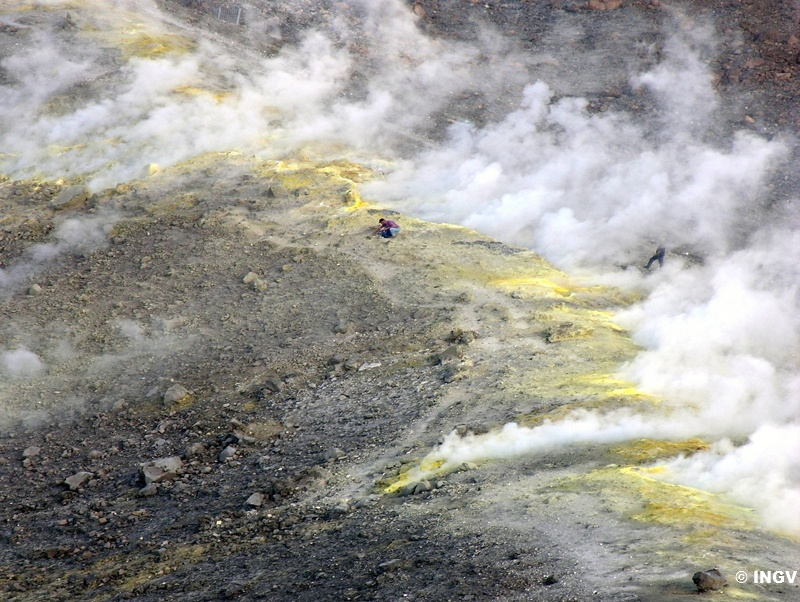
Surveillance Room of the Vesuvius Observatory, INGV-Na

Vulcano fumaroles (photo by G.Capasso)
According to the framework agreement stipulated between INGV and the Department of Civil Protection (DPC), the Institute carries out surveillance activities of active Italian volcanoes through the collection, processing and analysis of data collected by multi-parameter monitoring networks (link to specific web page). On the basis of these data, the institute prepares information relating to the state of the volcanoes which is transmitted according to procedures agreed with the DPC through press releases, bulletins and reports.
Information sharing between INGV and DPC is organized by volcano. For each volcano, a reference Section is identified among those present on the national territory. For the active volcanoes of the Neapolitan area (Vesuvius, Campi Flegrei, Ischia) the reference section is the Naples Section of the Vesuvius Observatory, while for the Sicilian ones (ie Etna, Stromboli, Vulcano, Pantelleria) it is the Catania Section - Etna Observatory . For the Colli Albani area, the reference section is the Roman section of the National Earthquake Observatory. In this context, the INGV Section of Palermo is responsible for the geochemical surveillance activities of Sicilian volcanoes.
The Observatories use the most technologically advanced systems to control the variation of various physical and chemical parameters that characterize natural phenomena in volcanic areas. In practice, dense networks of permanent and mobile stations (seismic, GPS, geochemical, geodetic, gravimetric and magnetic) are installed in the areas to be monitored in order to obtain a daily "logbook" of changes in the volcano and surrounding areas. Video surveillance systems and thermal cameras are also active for some volcanoes
The information collected through these instrumental networks and possibly registering changes in progress, is shared with the DPC through the sending of Press Releases, Bulletins (links) and Reports, documents drawn up according to formats and methods agreed between the two Entities. The Reports are used to transmit information relating to the occurrence of volcanic events or seismic events in volcanic areas or other significant events for civil protection purposes, such as swarms and sudden changes in the monitored parameters. The Bulletins report an overall summary of the activity status of a specific volcano, and information on the composition and maintenance status of the monitoring networks. They are published with a frequency agreed with the DPC and can be on a daily, weekly or monthly basis. The Reports describe the state of each of the monitored volcanoes and a summary evaluation of the observed phenomena.
At the Naples and Catania sections there are two Monitoring Rooms operating 24 hours a day (photo) in which all the data coming from the multi-parameter networks converge and are analysed, even in real time. These rooms are manned continuously (24 hours a day) by staff of the institute through surveillance shifts. The personnel on duty also have the task of transmitting the press releases to the DPC and to the other competent bodies and are assisted by personnel available 24/24, which differ according to the volcanic area considered.
The high competence that INGV has in surveillance has allowed the Institute to participate in the ARISTOTLE Project, where INGV has assumed the coordination of the verification of "European" volcanic activities. Overall "ARISTOTLE" provides a multi-hazard expert opinion for the DG-ECHO (European Civil Protection And Humanitarian Aid Operations) which provides a 7/24H "advice and expert judgment" service for earthquakes, tsunamis, volcanoes, meteorological events serious, floods and, in the prototype phase, fires. The service makes use of a virtual emergency room shared by the managers of the various hazards, from which it provides expert advice to ERCC, the coordination body in the event of activation of the European Civil Protection system.
Surveillance in the SICILIAN AREA
Surveillance COLLI ALBANI AREA


